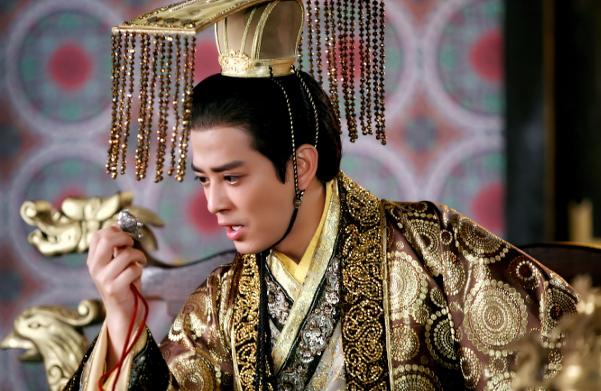In the history of China, Buddhism has had four "Dharma Difficulties", which is often referred to as the "Three Martial Arts and One Sect to Destroy the Buddha", referring to the campaign to destroy Buddhism led by Emperor Taiwu of the Northern Wei Dynasty, Emperor Wu of the Northern Zhou Dynasty, Emperor Wuzong of Tang, and Emperor Shizong of later Zhou. The reasons for the four people to destroy the Buddha are not the same, and today mainly introduces the extermination of the Buddha by yuwen Yong, the Emperor of the Northern Zhou Dynasty during the Southern and Northern Dynasties. Emperor Wu of the Northern Zhou Dynasty was a brilliant emperor who originally believed in Buddhism, but why did he embark on the road of destroying Buddhism?
Emperor Yuwen of the Northern Zhou Dynasty was the fourth son of Yuwen Tai, a western Wei chancellor. After Yuwen Tai's death, his nephews successively installed Yuwen Jue and Yuwen Yu as emperors, killed them, and then put Yuwen Yong on the throne. With the experience of the two brothers, Yuwen Yong has always been more cautious, and after twelve years as a puppet emperor, he launched a coup d'état and personally eliminated Yuwen Hu. From then on, Yuwen Yong began to pro-government, and in 574 carried out a campaign to destroy the Buddha.

During the period of extinguishing the Buddha, the monk Hui Yuan had a debate with Emperor Wu of the Northern Zhou Dynasty, and he finally said: "Your Majesty is now a man of evil opinions who is free to destroy the Three Jewels. Hell is not simple and noble, so why isn't Your Majesty afraid?" This means that His Majesty's reliance on power to destroy Buddhism is an act of evil. Hell is not to distinguish between the noble and the lowly, and is it rare that His Majesty is not afraid? Emperor Wu of the Northern Zhou Dynasty was very angry after hearing Hui Yuan's words, and looked directly at Hui Yuan and said the real reason why he destroyed the Buddha, "But it makes the people happy, and he does not give up all the sufferings of hell!" ”
Completely different from the hatred between religions in the West, Emperor Wu of the Northern Zhou Dynasty destroyed Buddhism not because of a matter of faith, but because of the world! From the end of the Eastern Han Dynasty, the world fell into a situation of war, although the Western Jin Dynasty was briefly unified, but soon fell into a longer war, from the Sixteen Kingdoms of the Eastern Jin Dynasty to the confrontation between the North and the South. Many aspiring emperors wanted to end this chaotic world and rebuild the Taiping Dynasty, but they failed to realize this wish, such as Jian Jian and Emperor Xiaowen of Northern Wei.
Although Emperor Wu of the Northern Zhou Dynasty was a Humble Man, his degree of Sinicization was relatively high, and his talent was not inferior to that of the later Tang Emperor Songzu, and the Ming Dynasty scholar Wang Fuzhi even believed that "the government of Yuwen Yong is full of pamphlets, if you drive han, jing, ming, and zhang." Although Yuwen Yong had the talent to unify the world, the regime he held was not strong. At that time, the world was in a three-legged situation, with Northern Qi occupying the economically developed Kwantung region, the Chen Dynasty partial to the southern part of the Anjiang River, and northern Zhou only concerning the Central and Sichuan-Shu regions.
Emperor Wu of northern Zhou knew very well in his heart that only by fully mobilizing the strength of the whole country could he take the initiative in the war to seize the world, and after solving the problem of Yuwen Hu, he also faced a serious problem, that is, the monastic economy affected the state power. During the Southern and Northern Dynasties, Buddhism flourished in China, and monasteries were built everywhere, which occupied a large amount of land, and many peasants attached themselves to the monasteries, forming a monastic economy.
These monasteries not only did not have to pay taxes to the government, but also led to a great reduction in the military service and military resources of the imperial court, and the monastic economy had seriously affected the strength of the country. In order to unify the world and end the chaotic situation, Yuwen Yong had to strengthen the national strength of Northern Zhou before he could launch a unification war, so he set his sights on the monasteries and launched a campaign to destroy Buddhism. Emperor Wu of the Northern Zhou Dynasty had a clear purpose, "to seek soldiers among the monks and take the land under the pagoda temple."
However, it should be noted that the Northern Zhou Wu Emperor's destruction of the Buddha was different from the Northern Wei Taiwu Emperor, who did not kill a monk or nun. The movement achieved obvious results, and the number of lay monks and nuns reached 3 million, providing a large number of soldiers and forced labor for the Northern Zhou, and increasing the financial revenue of the Northern Zhou. In 577, Emperor Wu of Northern Zhou personally led an army to destroy the powerful Northern Qi regime with few victories and more victories. Just as he was preparing to unify the world, Emperor Wu of Northern Zhou fell on the way to the Northern Expedition at the age of 36.
References: 1. Book of Zhou, 2. Zizhi Tongjian, 3. Guanghong Ming collection